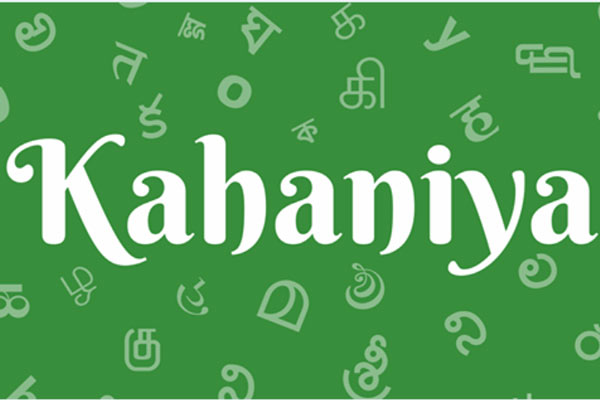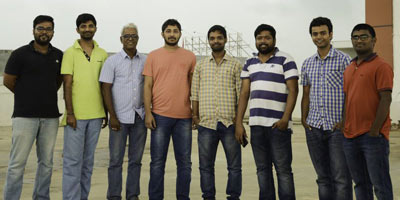
 There are two kinds of people in this world one who love to read stories and the one who love to write stories. A Hyderabad startup based out of T-Hub, Kahaniya is a platform where readers find fiction and inspiration while writers find readers and encouragement. Telugu360 is in conversation with Pallav Bajjuri – the CEO of Kahaniya and a graduate from Boston University, who shares with us his Kahani…
There are two kinds of people in this world one who love to read stories and the one who love to write stories. A Hyderabad startup based out of T-Hub, Kahaniya is a platform where readers find fiction and inspiration while writers find readers and encouragement. Telugu360 is in conversation with Pallav Bajjuri – the CEO of Kahaniya and a graduate from Boston University, who shares with us his Kahani…
Can you pitch for Kahaniya?
Sure. Our vision for Kahaniya is a world where we see language as an opportunity to share information. Language is now barrier to consume information or share. We want to break the barrier and make language an opportunity to share and consume. I can confidently say we are the best platform for the writers, period.
Do you want to talk about any specific Kahani from the startup?
Kalki is the most read series on Kahaniya. After a few chapters, the writer was confident that the series will sell and attached a price. The initial six chapters are free and from the seventh, each chapter is priced incrementally. People were buying it. Realizing his opportunity, the writer later gave a discount and set a bulk price of rupees sixty five for the entire series. He is pricing it dynamically whenever he wants and readers are buying it only after reading the few chapters. People even want to turn Kalki into a feature film.
How do you set your targets?
We want to launch one new language after every two months. We have about ten Indian languages now. Once we are done here, we want to go international. In each language there are different kinds of content. Currently we are focused on short fiction and serialized fiction. Eventually, we want to get into non-fiction, education, current affairs. How much of these we are delivering are our targets.
For a website ranking is important, does the website ranking bother you in your self-assessment?
 No. We personally do not believe in the rankings. Different languages, different populations, different markets. We were able to crack Telugu which is traditionally known to be bleak in literature market. We have been trying to establish Proof of concept and Proof of revenue model to go into the larger markets like Hindi, Tamil, Malayalam and Bengali. Until we go there we cannot judge ourselves by sheer website rankings. Our self-assessment goes on the number of people purchasing stories. Our sales and growth rate have been increasing exponential each month.
No. We personally do not believe in the rankings. Different languages, different populations, different markets. We were able to crack Telugu which is traditionally known to be bleak in literature market. We have been trying to establish Proof of concept and Proof of revenue model to go into the larger markets like Hindi, Tamil, Malayalam and Bengali. Until we go there we cannot judge ourselves by sheer website rankings. Our self-assessment goes on the number of people purchasing stories. Our sales and growth rate have been increasing exponential each month.
So are the publishers your competitors, since you are unique to your space?
Not really, we don’t consider them as competitors. Even though the book publishers see us as a competition. But we are working with them to accommodate them rather than compete with them.
Are you working with the organizations like TANA or ATA to target NRIs?
Not at an organization level as such. But yes, definitely they are our target audience. In fact it is working the other way round. Individual audiences are reaching out to us. Our contacts are helping us to connect with people who are around the world and can make the most from our platform.
Do you scan the books and put them up?
No, we do not upload pdfs or scanned copies. To read books one needs to have like ten different apps for different formats mobi, epub etc. However, to read on Kahaniya all you need is an internet connection. It is more akin to a blog where all the content is netted.
If you are akin to a blog, why should people choose you?
Professional writers would never publish books on blogs. If someone is writing a blog, there are multiple challenges: how do you prevent piracy, market it, build audience and monetize it. Also, in a traditional model, the publisher decides the price, quality, how and where the book is sold, distribution channels and everything. We are a self-service marketplace. The writer decides everything.
So can we call it as a library of regional things?
Yes, you can. But that is what it is only today. Our target is not just being a library. The way we look at it is, Kahaniya is a market place for regional language content. Marketplace in the sense that someone can publish and sell while someone else can buy and read.
How do you deal with plagiarism?
For English it is easy to figure out plagiarism because there are tools for it. But for regional languages there are no such tools and it becomes difficult. For regional languages if someone raises a flag we tackle it, but so far nothing of such kind happened.
With so many literature groups around, how encouraging is the government?
They have been really very encouraging. We will work with every government and have already met with the leads of Department of languages. Both Telugu governments bring in anthologies from time to time, which they have digitized on Kahaniya.
What do you think of policies which bar people from speaking in mother tongue or changing the medium of instruction?
English is not natural to us and nobody can impose English as medium of conversation. We speak to our parents in our mother tongue and watch regional films. But our education forces English on us. When you understand the world in native language, but then turn to English for professional growth, it doesn’t really sync up. These are the audience we want to focus. Changing medium is never going to work. There are practical problems. Medium of understanding and medium of living is different from the medium being imposed on you for professional reasons. That is the barrier Kahaniya is trying to break.

















